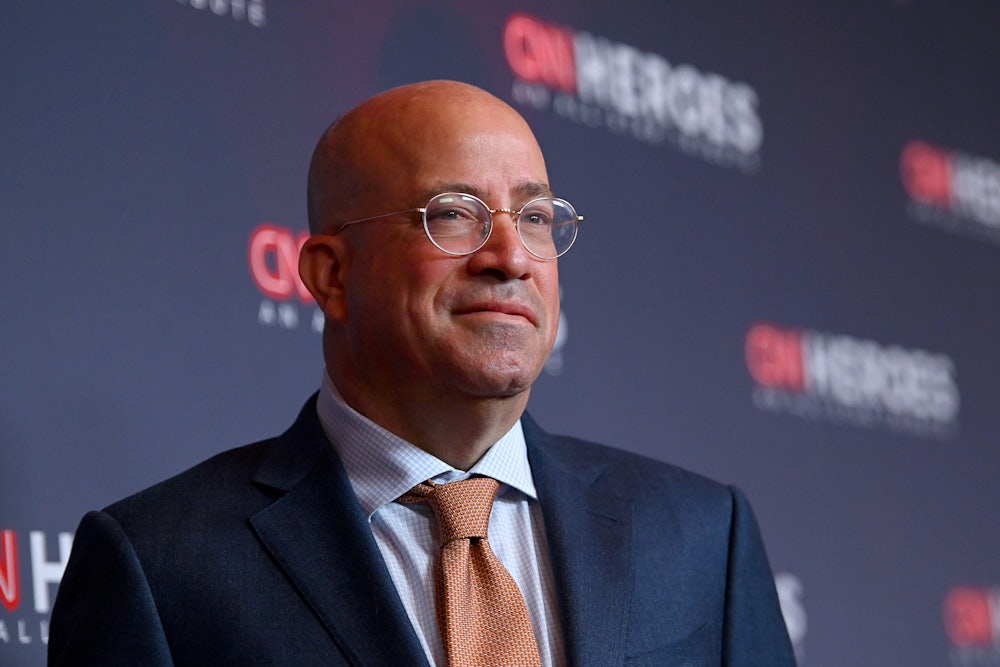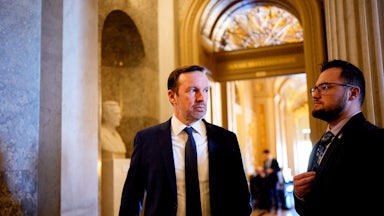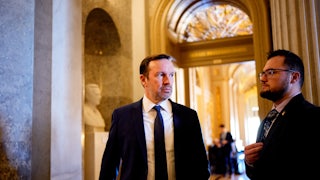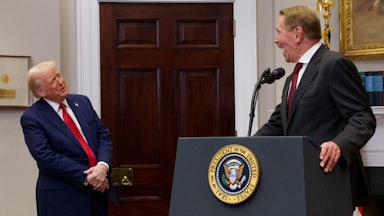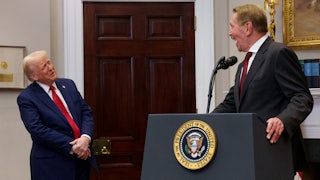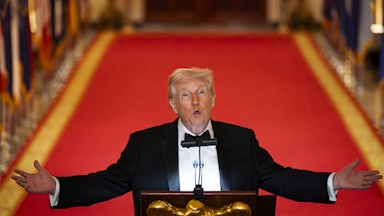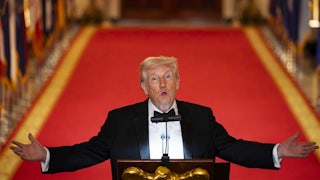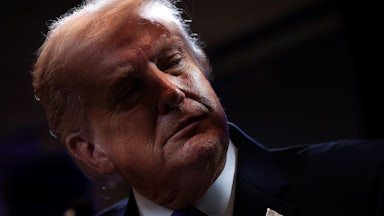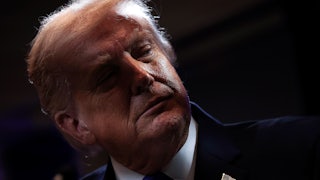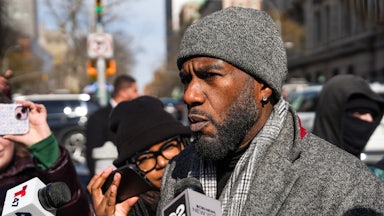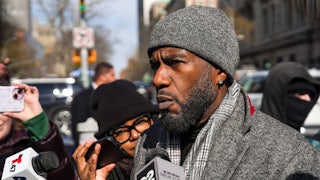Speaking to Vanity Fair in 2018, then–CNN chief Jeff Zucker made the case that his decision to transform the network he ran into a near 24/7 Trumpathon was just good business. “People say all the time, ‘Oh, I don’t want to talk about Trump. I’ve had too much Trump,’” he said. “And yet at the end of the day, all they want to do is talk about Trump. We’ve seen that, anytime you break away from the Trump story and cover other events in this era, the audience goes away. So we know that, right now, Donald Trump dominates.”
It’s a quote that neatly summarizes much of Zucker’s approach to television, and cable news in particular. He made a name for himself turning NBC’s Today into an early morning juggernaut, “a feat,” Mark Harris wrote for New York in 2009, “that required two skills—thinking brilliantly in three-to-six-minute increments, and coming up with stunt programming.” The most important thing in the television business is ensuring no one changes the channel. So when Donald Trump first glided down his escalator at Trump Tower, in June 2015, to announce the series premiere of Donald Trump’s Garbage Fire Forever, Zucker knew he had a hit on his hands. He tended to that project at the expense of all other considerations.
It may be said that Zucker was, for a time, one of Trump’s most important enablers—first for gleefully handing the editorial reins over to Trump’s insurgent campaign, then for speaking out against the then-president’s constant stream of invective directed at the network and its journalists. But his ties to Trump came at a cost. Trump, never one to see the benefits of a nuanced relationship, only wanted nonstop hagiography. CNN quickly became branded part of the liberal media—a label it had, more or less, eschewed—before entering into a post-Trump identity crisis.
On Wednesday, Zucker suddenly resigned, saying that he had concealed a romantic relationship with a subordinate, later revealed to be Allison Gollust, CNN’s executive vice president and chief marketing officer. Gollust, incidentally, used to work for Andrew Cuomo; their relationship came to light during the network’s investigation into former anchor Chris Cuomo’s work defending his brother from sexual harassment charges. Not long after Zucker’s shocking announcement, Gollust is staying at the network; in a statement, she noted that their relationship “changed during Covid” and that she regretted not disclosing it sooner. Just one more regret to throw on the pile.
Oddly, Zucker’s relationship with Gollust has long been something of an open secret—there have been references to it in the tabloids and even in Katie Couric’s memoir. It’s unclear why Zucker would be pushed out over this relationship, and it seems unlikely that his overlords at WarnerMedia didn’t know about it.
Were Zucker’s sins all that original? During the interminable 2016 election, other networks made the same calculus that Zucker did. Other executives did, as well: CBS’s Les Moonves, before being ousted amid multiple sexual assault allegations, famously told investors that Trump’s campaign “may not be good for America” but was “damn good for CBS.” Still, no one attached themselves, remora-like, to the mogul with more gusto than Zucker. The defining shot of Zucker’s tenure at CNN may very well be a lingering look at an empty lectern at a Trump rally. Cable news aficionados can no doubt recall how those shots could extend indefinitely, almost as a piece of performance art about what stares back when you stare into the void. Deferring to no news event or editorial decision, the lectern long shots were a CNN mainstay, lingering on the lens with a fiendish determination as the network’s overstuffed panels of alleged experts shouted at each other off-screen.
Flashy political conflict and substance-free debate between participants from America’s two political teams has long been a defining feature of American cable news television. But Zucker pushed it to, and past, its limits. Some of this, it should be stressed, was driven by a desire to accurately reflect the current makeup of our very broken politics. CNN, particularly in the early Trump years, featured a rotating cast of cable news stock characters who were intended to stand in for the president and his supporters. (In another accurate reflection of our broken politics, many of these were pushed out amid scandal.)
But Zucker’s commitment to Trumpification wasn’t founded in the idea that CNN viewers deserved an accurate or nuanced view of those beliefs or politics. Rather, it was a cynical bet that as long as CNN could keep viewers twigged-out about Trump, the ratings would be well and duly goosed and the money would come in stacks. It worked for a long, long time. CNN was one of the big winners in the Trump media bonanza: In 2016, it raked in nearly a billion dollars in gross profit.
The craven nature of Zucker’s strategies were as obvious as Trump’s unfitness for office and the consequent danger he posed to democracy and the rule of law. Glossing over Trump’s uncanny moral deficits and treating his threats as a normal part of political conflict was a mistake. But turning it into entertainment was unconscionable. The early media coverage Trump received was pivotal to his electoral success, and CNN played an outsize role in treating his campaign as a kind of political pirate ship—a little threatening, sure, but thrilling, too.
Those decisions caught up with the network as its conflicts with Trump grew in magnitude. In a way, this was a blessing for Zucker, who could now indulge in a bit of kayfabe: defending his journalists and trading barbs with the president as if they were sincere antagonists, instead of accounting for the synergistic role he played in the president’s rise to power.
Zucker’s exit now is, in some ways, a blessing as well. Like many other news organizations, CNN has struggled to figure out what it should be in the post-Trump era. Zucker’s relationship with Trump and his efforts to cash in on the president’s entertainment value have hurt the network in the same way his attempt to cash in on Governor Andrew Cuomo’s splashy Covid (and Trump) defiance did. These ploys illuminated a lack of consistent journalistic values, and befouled the effort to pitch CNN as the cable news channel of the middle ground between the “liberal” MSNBC and the Trumpian Fox News Channel. Zucker’s hokey attempts at performing political neutrality ended up satisfying almost no one; his cynical bid to juice profits ended up scandalizing everyone. Zucker did succeed in rejuvenating the network, something many thought was not possible when he took the reins. But he’s left it in the midst of another identity crisis.
Nevertheless it was, for a short period, extremely lucrative. Zucker has long had a reputation for steering into chaos and somehow yanking success from the stunt; the particularly tumultuous period in NBC’s history he oversaw was much in line with the idea that messy could be damned interesting. (I first became aware of him, for instance, during the all-consuming debacle surrounding Jay Leno’s “retirement.”) “Zucker is a case study in the most destructive media executive ever to exist,” an executive at a rival network told Maureen Dowd in 2013. “You’d have to tell me who else has taken a once-great network and literally destroyed it.” But Zucker also has a reputation for failing up consistently throughout his career. He’ll almost certainly find his way back to the infotainment summit, and it’s unlikely that he’ll have answered for his role in Trump’s political rise when he arrives.
